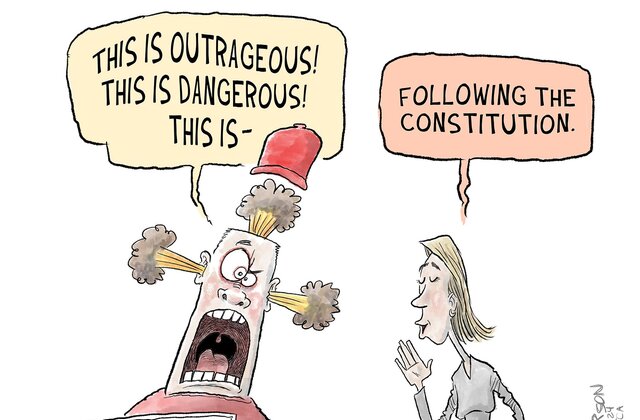[ad_1]
A New York The federal jury deliberated for hours before reaching a verdict in Dmitry Rybolovlev’s case against Sotheby’s, New York Times reported, The fertilizer titan alleged that the auction house helped a Swiss art dealer defraud more than $160 million by quietly charging huge markups on works he acquired. cried when he testified Earlier this month, he said he had lost not only money but also trust.
Sotheby’s said it was not aware of any misconduct and said it had followed all legal, financial and industry standards. It took the decision on Tuesday as a mark of full confirmation.
“Today’s decision reaffirms Sotheby’s long-term commitment to maintaining the highest standards of integrity, ethics and professionalism in all aspects of the art market,” the auction house said in a statement after the decision.
However, Rybolovlev’s lawyer Daniel Kornstein said that “secrecy has made a complex aid and fraud case difficult to prove.”
political cartoon

“This case has achieved our goal of shining a light on the lack of transparency that plagues the art market,” the lawyer said, calling for reforms.
Rybolovlev, 57, spent $2 billion from 2002 to 2014 to build a major art collection featuring works by luminaries such as Picasso, Rodin, Modigliani, Klimt, Magritte and Leonardo da Vinci. For help in finding and acquiring art, he turned to the Swiss broker Yves Bouvier.
The collector testified that he trusted Bouvier “like family”, even inviting him to small birthday parties – before admitting that the art dealer was deceiving him. He alleged that Bouvier drastically increased the prices paid by Rybolovlev and pocketed the difference to his own account along with his agreed 2% commission.
According to Bouvier’s lawyers, Bouvier and Rybolovlev settled on undisclosed terms in December. He said this month that he “strongly opposes any allegations of fraud.”
In private transactions, Sotheby’s sold some of Bouvier’s works which he then sold to Rybolovlev. The billionaire’s lawyers argued that the auction house either knew – or should have known – that Rybolovlev was being defrauded and informed him.
“So it is not a money issue. Well, not only of the money,” Rybolovlev said through a court interpreter on the witness stand. “It is important for the art market to be more transparent. Because… when the biggest company in the industry is involved in these kinds of activities, you know, customers don’t stand a chance.
Sotheby’s attorney Sarah Schudofsky argued that the businessman was “trying to make an innocent party pay for what someone else did to him.” He said Rybolovlev did not ask enough questions of Bouvier or take adequate steps to prevent fraud.
Rybolovlev accused Bouvier of fraud relating to 38 artworks. Only four were at issue in the trial, including Da Vinci’s “Salvator Mundi, “A portrait of Jesus Christ. Its whereabouts were unknown for centuries.
Rybolovlev’s lawyers said Bouvier bought it from Sotheby’s for $83 million, then sold it to the billionaire a day later for more than $127 million.
In 2017, Rybolovlev sold it through Christie’s for a historic $450 million and it became most expensive painting Sometimes sold at auction.
Copyright 2024 The associated Press, All rights reserved. This material may not be published, broadcast, rewritten, or redistributed.
[ad_2]
Source link
